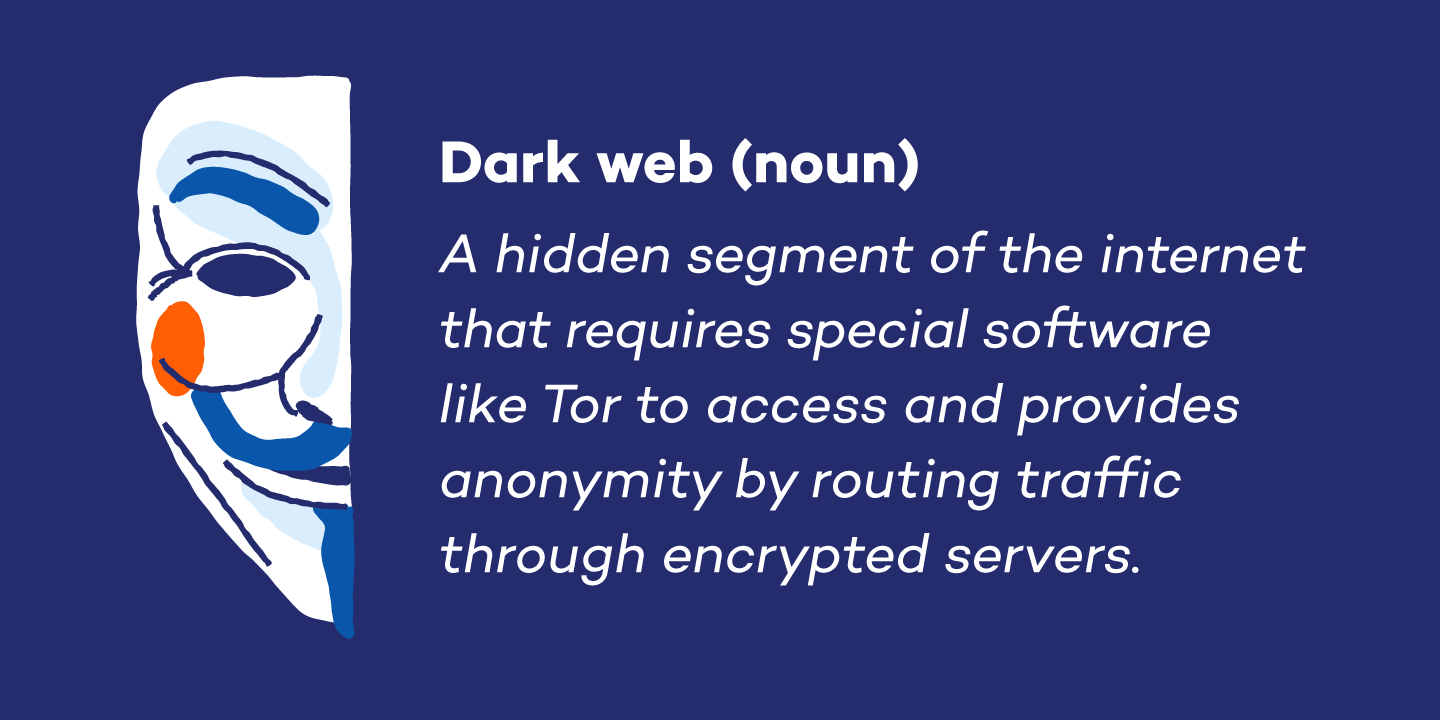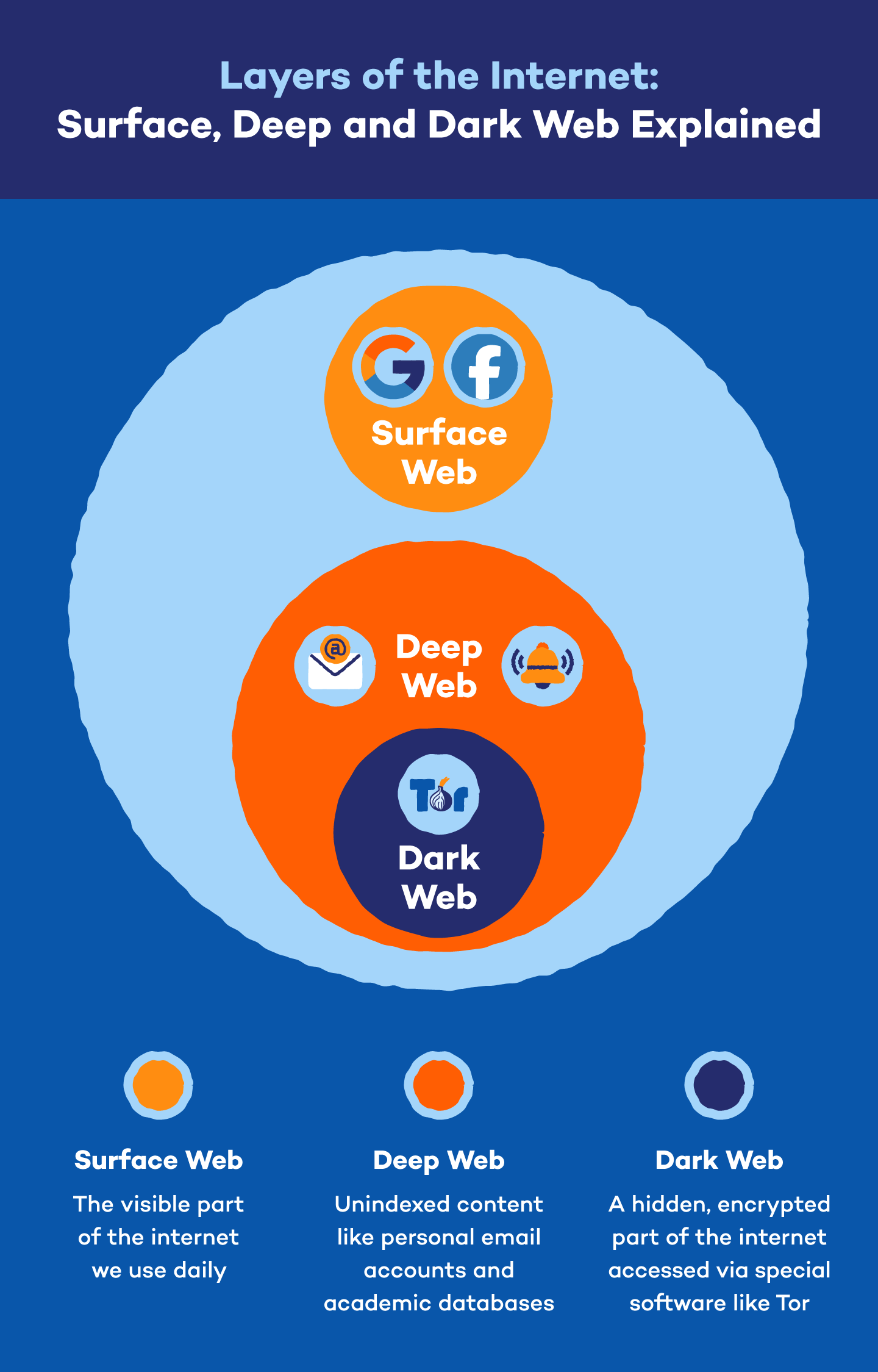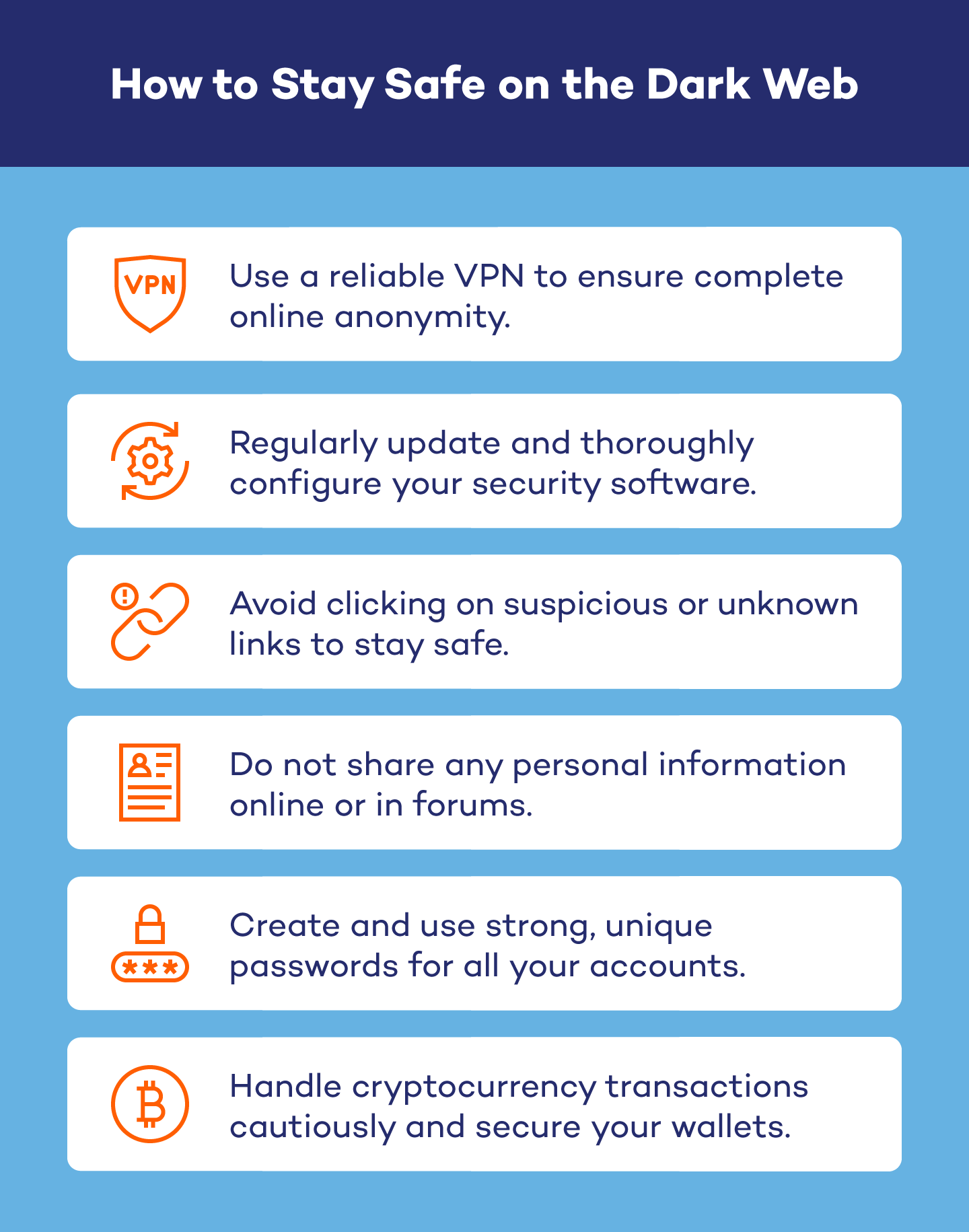The dark web is a part of the internet that requires special software to access and is not indexed by traditional search engines. It provides a high level of anonymity and privacy, hosting both legal and illegal content in a hidden, encrypted network.
Imagine a vast, shadowy expanse of the internet where the usual search engines dare not tread — this is the dark web. It’s a hidden layer of the internet, shrouded in secrecy, that you can’t access using traditional search engines like Google or Bing. Unlike the websites you browse daily, the dark web requires special tools to access and explore. It’s like a secret alleyway (say Diagon Alley from “Harry Potter”) in the sprawling city of the internet, known only to those who seek it out.
In this post, we’ll cover the ins and outs of the dark web, exploring its unique characteristics, how it differs from the surface and deep web and the potential risks and benefits associated with it.
What Is the Dark Web?
The dark web is a hidden part of the internet that requires specialized software like the Tor Browser to get access. Unlike the surface web, which consists of websites indexed by search engines, dark web websites are not searchable through standard browsers. It operates on a separate network that anonymizes users by routing their traffic through a series of encrypted servers, making it difficult to trace activities or identify users.
The dark web is a subset of the deep web, which includes any online content not visible on normal search engines, such as private databases and personal email accounts. While it has a reputation for hosting illegal activities, it also serves legitimate purposes, such as providing a platform for whistleblowers, journalists and privacy-conscious users seeking anonymity.
 What Is Available on the Dark Web?
What Is Available on the Dark Web?
The dark web is like the mysterious basement of the internet — dimly lit, a little spooky and filled with stuff you probably shouldn’t touch. But don’t let its reputation fool you; the dark web isn’t all shadowy figures in hoodies plotting world domination.
Sure, you’ll find a fair share of illegal activities and dubious marketplaces, but the dark web is also home to a variety of content that isn’t inherently evil. It’s a place where privacy enthusiasts, journalists and those living under oppressive regimes can operate with a degree of anonymity.
Here are a few things you can find on the dark web:
- Illegal goods: Drugs, weapons and counterfeit items
- Hacker services: Hiring different types of hackers for illegal purposes
- Stolen data: Personal information, credit card numbers and login credentials
- Unregulated marketplaces: Trade platforms for all sorts of goods — some legitimate, others not
- Illegal streaming services: Pirated movies, music and TV shows
- Fake IDs and passports: Services offering counterfeit documents
- Hidden social networks: Forums and chat rooms often discussing illegal or taboo topics
But some people use the dark web for the good things it offers, such as:
- Privacy protection: For those who wish to browse anonymously or protect their personal information from surveillance
- Whistleblowing: Platforms like SecureDrop allow people to share information with journalists anonymously
- Circumventing censorship: Individuals living under oppressive regimes use the dark web to access information and communicate without government restrictions
- Cryptocurrency exchanges: Facilitating private transactions that are less traceable
- Forums for the inquisitive: Niche communities and forums discussing various legal topics
Remember, while the dark web hosts a range of content, accessing illegal materials or services is, well, illegal.
Dark Web vs. Deep Web vs. Surface Web
Not sure how the dark web, deep web and surface web differ? Well, for one, each part serves a unique purpose and operates under varying levels of visibility and accessibility. Let’s discuss some more differences so you can easily distinguish them.
Surface Web
The surface web is the part of the internet most of us interact with daily. It includes all the websites and pages that are indexed by search engines like Google, Bing and Yahoo. When you search for your favorite recipe, check the news or browse social media, you’re using the surface web.
While it may seem vast, the surface web actually makes up only a small fraction of the entire web. Think of it as the glossy shop windows of the internet — what you see is only what’s on display, neatly categorized and searchable.
Deep Web
The deep web is significantly larger than the surface web and includes all the content that isn’t indexed by traditional search engines. This isn’t as mysterious as it sounds; the deep web encompasses everything from your private email accounts and online banking information to subscription-only websites and academic databases.
The deep web is crucial for maintaining privacy and security online, as it keeps sensitive information away from the prying eyes of the public and search engines. While the term “deep web” might evoke images of hidden, secretive content, most of it is just routine data stored on private networks.
Dark Web
The dark web is a small portion of the deep web that has been intentionally hidden and is inaccessible through standard web browsers. To access it, you need dark web browsers like Tor, which allows users to browse anonymously by bouncing their connections through a global network of volunteer servers.
This level of anonymity makes the dark web a haven for illegal activities, such as drug trafficking and various types of cybercrime. The dark web operates in a realm where privacy is paramount, but its potential for misuse requires you to tread with caution.

How to Access the Dark Web Safely
Venturing into the dark web requires extra precautions to ensure your safety and privacy. While it might sound daunting, following a few key steps can help you explore this hidden part of the internet without falling into its pitfalls. Here are some steps you can take to navigate the dark web securely and responsibly.
Use the Tor Browser
Wondering how to find the dark web? Use the Tor Browser (or Onion Browser). It’s a free, open-source software that enables anonymous browsing by routing your connection through a network of servers around the world. Here are a few things to keep in mind:
- Make sure you download the Tor Browser only from its official website to avoid malicious software versions.
- Once installed, use Tor just like any other browser.
- Keep your dark web browser and its components up-to-date.
- Avoid downloading files or enabling scripts as they could compromise your anonymity.
Use a Dark Web Search Engine
Finding content on the dark web isn’t as straightforward as using Google. You’ll need a specialized dark web search engine, like Ahmia or DuckDuckGo’s Tor service, which can help you locate onion sites (also called Tor sites).
These search engines prioritize privacy and often index websites that aren’t listed on the surface web. Keep in mind that the dark web can be unpredictable, and search engines may not always yield comprehensive results. Be cautious about the links you click on, as not all content is safe or legal.
Access the Dark Web Marketplaces and Forums
Dark web marketplaces and forums host a range of activities, from legal transactions to illegal operations. These sites often require registration and may use unique URL structures ending in “.onion” rather than “.com” or “.org.”
For example, a dark web URL might look like this: http://3g2upl4pq6kufc4m.onion.
If you decide to visit these marketplaces, exercise extreme caution and remain aware of the legal implications of your actions. Always prioritize your privacy by not sharing personal information, and use additional security measures like a VPN to further protect your identity.
Navigating the dark web can be like exploring a labyrinth — there are hidden treasures but also potential traps. Always put your safety and legality first to ensure a secure browsing experience.
Types of Threats on the Dark Web
The dark web undoubtedly offers privacy and access to restricted content, but it also harbors many threats. You should proceed cautiously and be aware of the dangers lurking in the shadows. Here are some of the most common threats you might encounter on the dark web:
- Exposure to malware: The dark web is a breeding ground for malware. Clicking on the wrong link or downloading an innocent-looking file can expose your device to viruses, ransomware and spyware. Hackers often use malware to steal personal information, monitor your activities or even demand a ransom to unlock your files.
- Scams and fraud: Whether it’s fake marketplaces promising products that never arrive or phishing schemes designed to steal your personal information, the dark web is rife with deception. While on the dark web, avoid sharing personal or financial details, and verify the credibility of sites before engaging in transactions.
- Cybercrime and hacking: Hackers sell their services for various nefarious purposes, from breaking into accounts to stealing data. You may encounter forums where cybercriminals trade tools and techniques. Engaging with these communities is illegal and dangerous since law enforcement agencies often monitor them to catch offenders.
The dark web can be intriguing, but given its nature, you must stay vigilant and aware of the potential threats. Browse responsibly to ensure your experience doesn’t lead to unwelcome surprises.
Tips to Stay Safe on the Dark Web
As we mentioned, many dangers, such as malware, scams and cybercriminals, lurk in the hidden corners of the dark web, but by taking the right precautions, you can reduce your risk and navigate it more securely. Here are some tips to protect yourself while exploring the dark web:
Use a Reliable VPN for Anonymity
Using a VPN is crucial when accessing the dark web. A VPN encrypts your internet connection and masks your IP address, making it difficult for anyone to trace your online activities back to you.
It also adds an extra layer of anonymity, which is particularly important when browsing the dark web. Choose a reputable VPN service with strong encryption and a no-logs policy to ensure maximum privacy.
Regularly Update and Configure Security Software
Keeping your security software up-to-date is vital in protecting your device from threats. Regular updates ensure your antivirus and firewall can detect and block the latest malware.
Additionally, configure your security settings to provide maximum protection, such as firewall activation and using a VPN, while browsing the dark web. This helps safeguard your device from viruses, spyware and other malicious software.
Avoid Clicking on Suspicious Links
The dark web is full of links that can lead you to dangerous sites or trigger malware downloads. Visit links with caution, especially if they seem unfamiliar or suspicious.
Always double-check URLs, and don’t download files unless you are sure of their source. This simple habit can prevent many potential security issues and help you avoid getting hacked.
Do Not Share Personal Information
Protecting your personal information should be your priority when using the dark web. Don’t share sensitive details, such as your name, address, phone number or financial information, with anyone. Doing so could lead to identity theft or other forms of cybercrime. Maintain a high level of anonymity by using pseudonyms and encrypted communication whenever possible.
Use Strong, Unique Passwords for All Accounts
Secure your online accounts with unique, strong passwords that are difficult to crack, such as a combination of uppercase and lowercase letters along with numbers and special symbols.
Avoid using the same password across multiple sites since it increases your vulnerability if one account is compromised. You can also use a password manager to generate and store complex passwords with ease.
Use Cryptocurrency Safely
Many transactions on the dark web use cryptocurrencies like Bitcoin for anonymity. Ensure you understand how to use cryptocurrency wallets securely, and never keep large amounts in a single wallet. Use a separate wallet for dark web transactions to further protect your funds.
The landscape of the dark web (and cyberthreats in general) is constantly changing, with new threats emerging regularly. Keep yourself informed about the latest security tips and potential risks by following cybersecurity blogs or forums.

The dark web is a double-edged sword — full of both potential and peril. As you venture into it, prioritize your safety by using tools like the Tor Browser and VPNs, keeping your security software updated and being cautious with your online behavior. To further enhance your safety, you can use dark web scanners to know if your personal information has been compromised.
Navigating the dark web responsibly and cautiously will help ensure your experience remains secure. Always prioritize safety and legality, and remember that your actions on the dark web can have real-world consequences. Stay safe, stay informed and browse wisely.
Dark Web FAQ
Still have some doubts about the dark web? Explore this FAQ section to get answers to some common queries about this hidden part of the internet.
Is the Dark Web Illegal?
Accessing the dark web is legal, but engaging in or supporting illegal activities while there is not. The dark web is simply a part of the internet that requires special tools like the Onion Browser to get access.
Who Created the Dark Web?
The dark web emerged from the broader deep web and was significantly shaped by the development of The Onion Router (Tor), a project originally funded by the U.S. Navy. The Tor Project, launched in the mid-1990s, aimed to create a secure and anonymous communication network. Over time, this technology evolved, providing the foundation for the dark web.
What Does Tor Browser Do?
The Tor Browser provides anonymity and privacy by routing your internet connection through a network of volunteer-operated servers around the world. This process, known as “onion routing,” masks your IP address and encrypts your data, making it difficult for anyone to trace your online activity.
Can the Government Track You on the Dark Web?
Yes, governments and law enforcement agencies have developed sophisticated techniques to track and investigate illegal activities on the dark web. They can sometimes identify users through other methods, such as monitoring behavior, exploiting vulnerabilities or conducting undercover operations.




